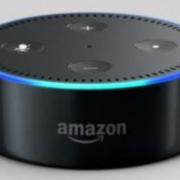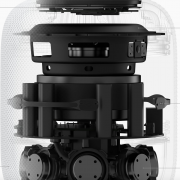Why Apple’s problems with its HomePod smartspeaker may benefit disabled iPhone users everywhere
Robin Christopherson | 16 Feb 2018Apple’s new HomePod is less of a smartspeaker and more a great quality speaker, but I thinks its advent spells good news for disabled people everywhere.
The smartspeakers sensation
Smartspeakers or ‘Home Assistants’ are here to stay - the best-selling item in the UK and US Amazon stores was the Amazon Echo Dot (pictured right), which has sold in the millions and is the home of Amazon’s popular artificial intelligence (AI) Alexa.
Less popular, but no less useful and entertaining, is the Google Home series. From the Google Home Mini to the huge Google Max, there is a Google equivalent speaker at a price and audio-quality to match Amazon’s range.
Some of these smartspeakers have screens but these are an incidental extra to an otherwise audio-only interface. You talk to your favourite home assistant and she (it’s usually a female voice) helpfully replies with the information, music or game of your choice.
Apple’s HomePod hits the scene
Coming very late to this party is the Apple HomePod (pictured right). Almost three years after Amazon created this category of tech, Apple has released a single model of smartspeaker which, due to its limited smarts at this time, is marketed as being a great speaker that can also do a very few home assistant-type activities.
Undoubtedly a beautiful product in both looks and sound, the HomePod at £329 is comparable in price to other high-end speakers that have built-in music streaming capabilities such as those from Sonos. However, the HomePod will inevitably be compared with other home assistants that have better AI capabilities. Even Sonos speakers which, until very recently, had no AI now have models that ship with Amazon’s Alexa built-in and for a comparable price.
Siri must now step up to the mark
The problem is that Siri, the AI built-into iPhones and iPads, has been falling behind in the smartness-stakes for some time. And the version that ships with the HomePod offers only a fraction of what Siri on your phone can do.
When compared to Alexa or Google’s Assistant the HomePod looks fancy but doesn’t seem that clever.
 Despite trying to focus on the quality of the sound, Apple is already suffering some poor press due to this obvious comparison with other products in this space.
Despite trying to focus on the quality of the sound, Apple is already suffering some poor press due to this obvious comparison with other products in this space.
I’m sure they predicted this and I am equally sure that they are pulling out all the stops to improve the version of Siri that lives in the HomePod so that, within months, it will do all the basic features (such as being able to check your calendar) we’ve all come to expect from other Home Assistants.
The clock is well and truly ticking
Apple needs to ensure that Siri on the HomePod can do the basics, but it will also need to be extensible like its competitors. It needs the ability to add third-party utilities, games and features such as Echo’s ‘skills’ and Google Home’s ‘apps’. Apple says that there are no plans for a ‘skill store’, but it will have to happen for them to compete – and again sooner rather than later.
A smarter Siri is better for everyone
Siri is a handy helpmate when you want to find a fact, set a timer, quickly send a text or create an appointment. For iPhone users with disabilities, however, that ability to have AI assist you with tasks can knock whole minutes off the activity. As a result, some disabled smartphone users consider their AI-assistant as not just a nice option for doing daily tasks, but as a massive time-saving addition to the smarts of their phone.
In routine tests of Alexa and Siri, in which I ask each to give me even the simplest of information (such as “When did America gain its independence?”), the Alexa comes up trumps every time, while Siri falls back on a web search. This will have to change – and quickly. Now that the screenless HomePod is on sale and open to public scrutiny, the imperative for it to become smarter is all-important for Apple.
The no-screen advantage
The fact that Alexa was developed in devices that did not have a screen means her abilities to give you information in a smart, conversational form has pushed the Alexa far ahead of Siri; who until now has only existed in devices that have a screen.
As I mentioned above, how many times have you asked Siri a seemingly straightforward question only for her to say “I’ve done a web search for that” and give you a number of search results – none of which immediately furnish you with the answer you were after. Alexa has never had the option of falling back on such a lazy response and, as a result, has now had many months of development that largely explains her huge popularity (that and the price).
An AI race to be best is good for everyone, including disabled people
As Apple scrambles to improve Siri’s smartness in the screenless HomePod, the company must surely bring those improvements back into the iPhone and iPad. No longer will we be thrown out to a web search or have her say ”Hmmm, I’m not sure about that” – instead we should actually get us the answer we need.
Siri getting smarter will help everyone - but every disabled iPhone or iPad user will be doubly delighted. A race to be the best is just what we need to help these smart assistants be great at assisting those most in need.
Robin Christopherson is AbilityNet's head of digital inclusion
Read related blogs
Alexa Vs Google Home vs Cortana: The battle to reach every user intensifies
Building Better Bots: Can Next Gen Tech Make the World a better place?



